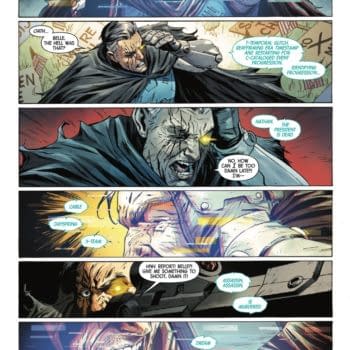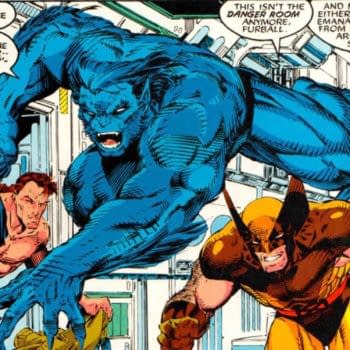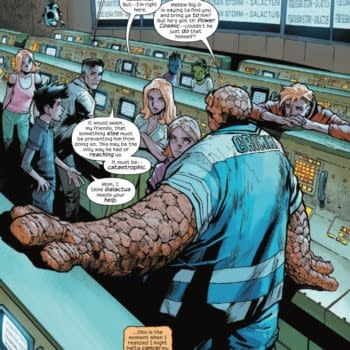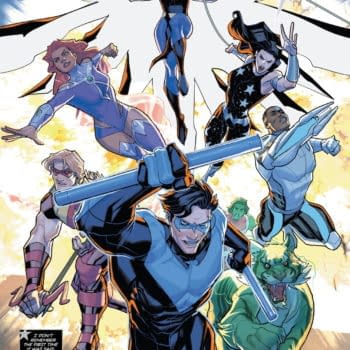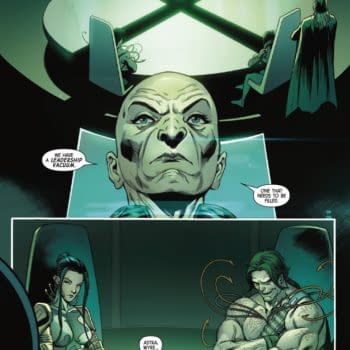Posted in: Comics | Tagged: Battlestar Galactica: Six, Comics, dynamite, entertainment, J.T. Krul, Rod Rodolfo
Everyone Is The Hero Of Their Own Story – J.T. Krul Talks Battlestar Galactica: Six
David Avallone, writer of Legenderry: Vampirella #4, talks with writer J.T. Krul about Battlestar Galactica: Six #5, both on sale now. Cover art by Jenny Frison and Rod Rodolfo

J.T. KRUL: I was also exposed to the original series when I just a boy, so it hit me at the right time. That and Buck Rogers were among my favorite shows back in the day. As for the reboot, I was a huge fan of it. I remember when it was first announced, it seemed like it was going to be very much like The Terminator, but once I started watching it I realized that Blade Runner was a more accurate comparison. And, since that is probably my favorite movie of all time, I was instantly hooked. The new BSG was probably was of the best shows of the past decade. It's funny how the same concept had two very different tones. The original Battlestar Galactica had a much stronger sense of hope than the new one, which was dominated by a constant frenzy of hopeless desperation.
DA: The Marvel comic that accompanied the original series stands up a little better than the show itself, thanks largely to Walt Simonson and Roger McKenzie. Have you read those?
JTK: I remember reading some of them when I was younger, but my exposure to the world of BSG was much more grounded in the TV shows.
DA: One of the most compelling aspects of the "Galactica" mythos is that the Cylons … like all good villains … have a point. This issue, showing some of their uprising from their perspective, reminded me – tonally, at least – of Conquest of the Planet of the Apes. Are the Cylons the "bad guys", or do you see it as more complex than that?
JTK: It's that old saying – "Everyone is the hero of their own story." To really explore the Cylons, you have to take that mindset — understand who they are and where they are coming from. If anything, my story is meant to pull back the curtain on that. Reveal that background and a sense of sympathy for Number Six and the Cylons. I mean, in the beginning of the original miniseries of the reboot, Number Six walks coldly through that park and snaps the baby's neck with a harsh detachment. In our story, we show the events leading up to that. The Cylons are the very definition of the word "complex." That was the whole reason I wanted to do the story in the first place. Complex is fun because of all the layers you get to pull back.

JTK: In this world, and any world for that matter, I think the truth is in the eye of the beholder when it comes to religion. Going back to humanity's polytheist origins and carrying the evolution through to our present monotheist frameworks, it's all the same thing — a means to explain the world around us, to offer us a sense of belonging and understanding. It's comfort food, helping us to celebrate the good times and cope with the bad times.
DA: To some degree, the audience knows how this story ends. How do you feel about working within that framework? Is it a limitation or a challenge, or both?
JTK: It has its challenges when you know you have to stay between the lines, so to speak, but a story like this is about exploring the quiet corners of the BSG universe. This is very much a science-fiction story that delves into the very genesis of the Cylons in terms of their mindset and mission in life. Using the different incarnations of Number Six on different planets allowed us to highlight several different stages of growth and development — physical, spiritual, emotional, etc. Life lessons for a Cylon if you will. The bottom line is that it doesn't matter if the audience knows where you are going, because I'm focusing on the journey to get there.
For more information on Battlestar Galactica: Six #5, click here.









